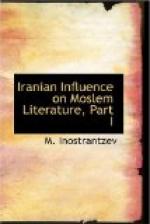The different categories of these translators
Omar ibn al Farrukhan of Tabaristan (Fihrist 273, 14-18) and his Kitab al Mahasin 79
Other authors of books of analogous titles in the first centuries of Islam,—the relation of these books to the books of “Virtues and Vices” (cf. Baihaqi, pseudo-Jahiz) and the connection of these books with the Parsi religious idea of the licit and the illicit,—Al Mahasin wal Masavi, and the Shayast la Shayast. 83
TRANSLATORS FROM PAHLAVI.
In the Fihrist (244, 25-245, 6) are stated a number of names of the principal translators from the Persian into the Arabic language. Assuredly this list is far from complete. The author names only a few calling attention to only particular translators. The passage in question in the Fihrist has been more than once utilised. The entire section has not been exhaustively examined. We believe that from it we can infer the general character of the contents of those translations which were prepared from Persian into Arabic and can gather some further indices regarding this list of names.
To examine the list of translators in order. First of all as may be expected is mentioned Ibn al Muqaffa about whom the Fihrist speaks in detail at another place. Then follow the family of Naubakht; Musa and Yusuf, the sons of Khalid; Abul Hasan Ali ibn Zyad at Tamimi—of his principal translations is mentioned “the Tables of Shahriyar;” Hasan ibn Sahal mentioned at the head of astronomers; Balazuri; Jabala ibn Salem, secretary of Hisham; Ishak ibn Yazid, translator of the Persian history entitled Khuday Nameh; Muhammad ibn al Jahm al Barmaki; Hisham ibn al Kasim; Musa ibn Isa al Kisravi; Zaduya ibn Shahuya al Isfahani; Muhammad ibn Behram al Isfahani; Behram ibn Mardanshah, Mobed mobedan of the City of Sabur in Fars; Umar ibn al Farrukhan of whom special mention is made by the author of the Fihrist.
An examination of the aforesaid names of translators in order would, it seems to us, afford material for the solution of the problem regarding the different varieties of Persian literary tradition in the first centuries of Islam. Ibn al Muqaffa stands in the first place belonging to him by right. He was a genuine encyclopaedic translator familiar with the Arab society with all its influence of spiritual Sasanian life of Persia finding expression in its literature. He translated scientific, epico-historical, and ethico-didactic books. Hence we can understand that in the Fihrist has been assigned to him a special notice as noted by us above.




